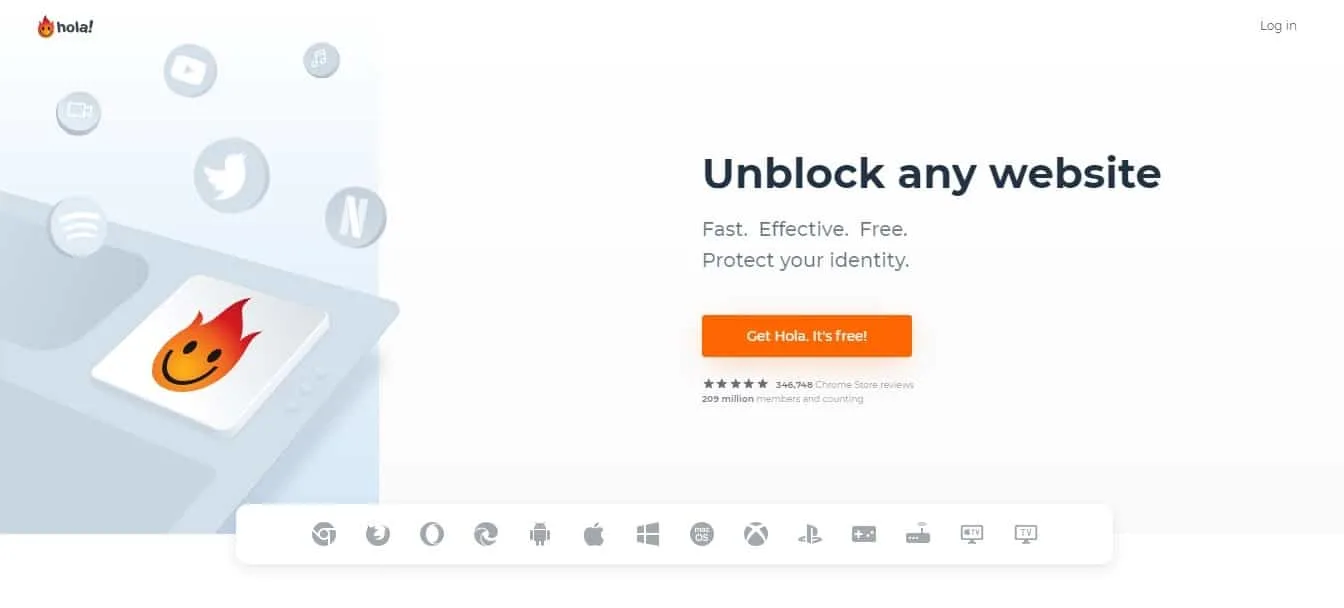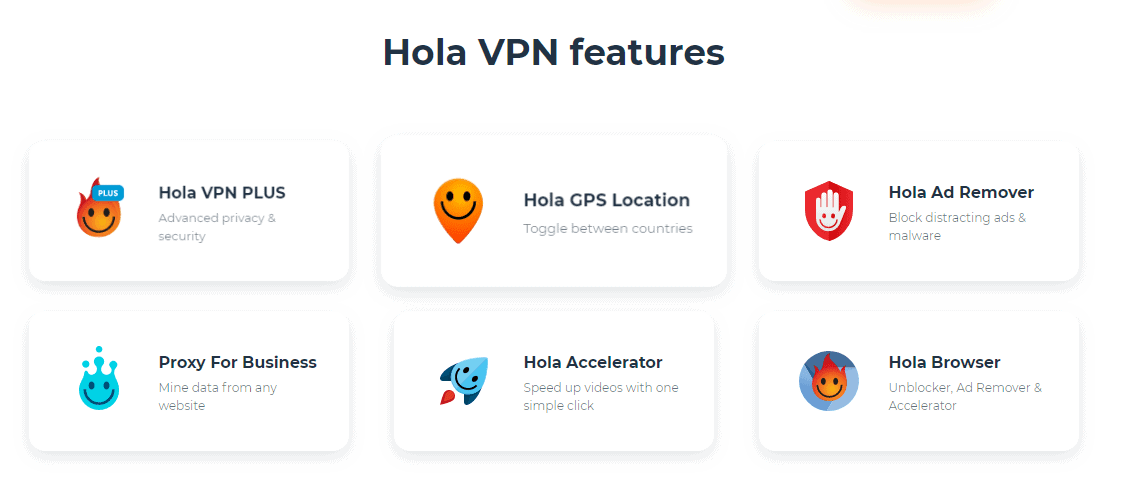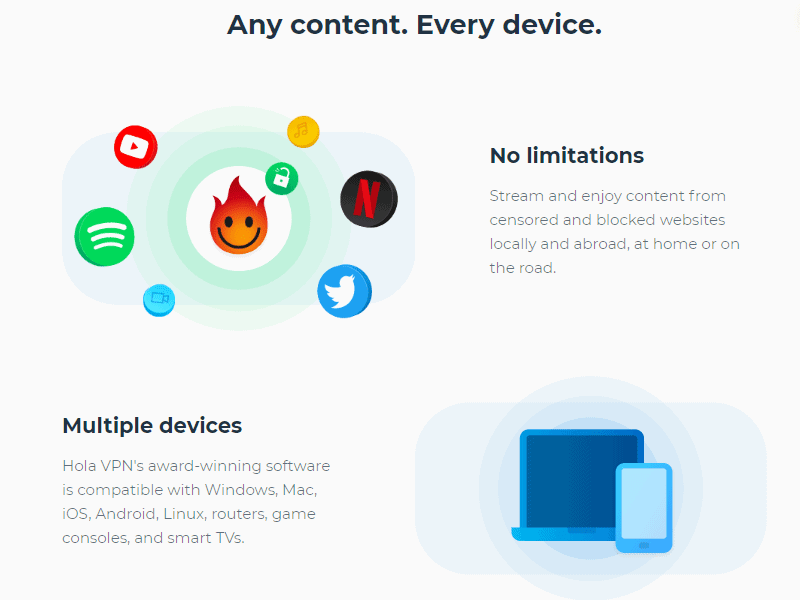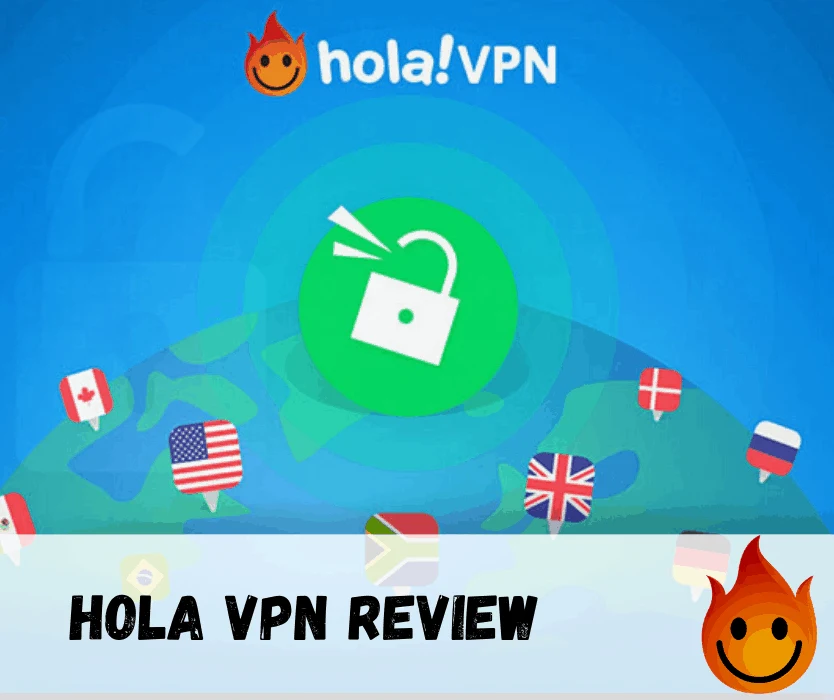There seem to be a million and one VPN providers on the market, so it stands to reason that there’s more than a few services that you’ve never heard of before.
Hola VPN is one service that isn’t as popular and well-known as industry-leading services like TorGuard VPN, PIA VPN, Express VPN, or PureVPN – and for good reason.
Despite naming their service after the Spanish word for “hello,” this service is actually based out of Israel. I find that to be incredibly misleading, but to be fair, plenty of big brands use the same kind of marketing tactics to appeal to foreign audiences. But whatever you do, make sure you read this review in its entirety before you ever download Hola!
If you haven’t heard about this service, then you’re in for a shock. We’re going to analyze this service piece by piece, so hold on to your hats as we take a closer look at one of the most scandalous VPN providers ever to tarnish the Internet.

Hola VPN Pricing
Hola VPN has one of the simplest pricing models around. They either offer a paid version of their VPN tunnel for $5.00 per month, which comes with a 30-day money-back guarantee, or you can download the free version of their service.
We’ll discuss the differences between the paid version and the free version in the features section, but for now understand that it’s not as good of a deal as it sounds.
The free version doesn’t have hardly any of the features that their competitors have. If you’re giddy at the thought of a free VPN service still, please, stop and read the rest of this review before making a decision.
Features of Hola
The features with the free version of the Hola VPN service are incredibly basic. They list the following as their main features:
- The ability to bypass Internet censorship (so can every other VPN tunnel)
- “Speed up your web browsing” (which isn’t necessarily true)
- “Save on bandwidth costs” (not exactly sure what they mean)
- Improve privacy online (so can every other VPN tunnel)
- No ads
- Unlimited use
- Android functionality
Most of the features they listed are common, standard features that should be available on every VPN tunnel – and some of them didn’t even make sense. But wait, there’s more bad news!

The only advantages to being a paid subscriber are the following:
- Never be a peer (this is a big deal)
- SSL encryption
- Support Hola in creating a better, faster, more open Internet (what a load of bull!)
In particular, I want to draw your attention to the “never be a peer” feature of the paid service.
Speed & Stability
Typically when I test out a new VPN service, I’ll test raw bandwidth statistics and upload/download speeds through a tunnel, and I’ll even gather latency statistics to test the connection’s reliability. But I didn’t do any of that for Hola VPN. In fact, I didn’t even download it and test it out.
Hola VPN is a rather sketchy service, and the last thing I wanted to do was take an unnecessary risk that could harm my computer.
If that sounds like a red flag to you, then you’re absolutely right. Read on to the final sections to see what I despised about this service so much.
At any rate, other users have left some pretty nasty reviews concerning sub-par speeds, inconsistent service, and choppy connections. It doesn’t seem that they can get anything right.
Security & Privacy
Now we have reached the crux of the issue surrounding Hola VPN, and it’s their security and privacy (or lack thereof). The core of any VPN service is a no-logs VPN tunnel that can secure data with modern encryption in such a way to give you the peace of mind that your Internet connection is as close to infallible as humanly possible.
But Hola doesn’t do that, and they’ve been found to be caught in some dubious botnet-type attacks in the past without the full knowledge of their users. The first red flag I saw on their website was the following statement: “Hola is the first community-powered (Peer-to-Peer) VPN, where users help each other to make the web accessible for all, by sharing their idle resources. We take great care to protect your privacy, security, and personal information.”
A P2P VPN tunnel? That sounds pretty darn sketchy to me, but as Levar Burton always used to say, don’t take my word for it. There are several dark and questionable aspects to their service, as we’ll discuss next.

Critical Warning
My advice is to not even download this service because they have been found to be misusing and abusing their customers’ Internet connections in the past. And there’s a whole laundry list of things they do that are immoral and insecure, including the following:
- Perform Internet tracking, despite their privacy policy
- Send other users’ traffic across your network interface and Internet connection using P2P
- Sell access to their network (which includes your computer/Internet connection because you’re part of their P2P network) to third parties
- Allowed code execution exploits in the past
It’s actually pretty ironic – the items on the list seem like they fit better on a list describing a virus than they do a VPN service. Now, these defects were discovered over a year ago, and it’s true that services change over time.
But I can’t honestly trust that this service has changed within such a short time frame. Even if they have cleaned up their act and stopped most (or all) of the negative and dubious network access processes, I’m still scared stupid to even go near them. They have lost the trust of the public, and I don’t want to go out on a limb…the risks are just too great.
For example, let’s consider the best and worst-case scenario. The best-case scenario is that I get a free VPN service, which isn’t that valuable since I already know where to get free trials and free VPN services (VyprVPN and CyberGhost VPN are my favorite free services, though they do have paid versions as well).
The worst-case scenario is that my computer becomes hacked, letting mysterious unidentified strangers from all over the world execute code on my machine and send traffic over my Internet connection.
The gains are almost non-existent in the best-case scenario, while the worst-case scenario could be catastrophic.
Final Thoughts – Is Hola VPN Worth the Risk?
So, is Hola VPN up to scratch and a good way to save money while simultaneously securing your Internet connection? Well, that depends.
Do you like being the victim of a botnet attack? Do you want your provider to use your bandwidth without your permission? Do you want more security vulnerabilities on your computer? If you answered yes to any of those questions, then go ahead and download Hola VPN, by all means.
Sarcasm aside, to be perfectly clear and blunt – don’t use this provider.
I know it may be tempting, especially because they’re free. But the fact remains that there are free trials and completely free service from legitimate providers.
Other Options: If you really need a VPN tunnel and can’t afford one, try out VyprVPN’s free trial or CyberGhost’s free service. They’re both watered down versions of their paid services, but it will get the job done at least.

